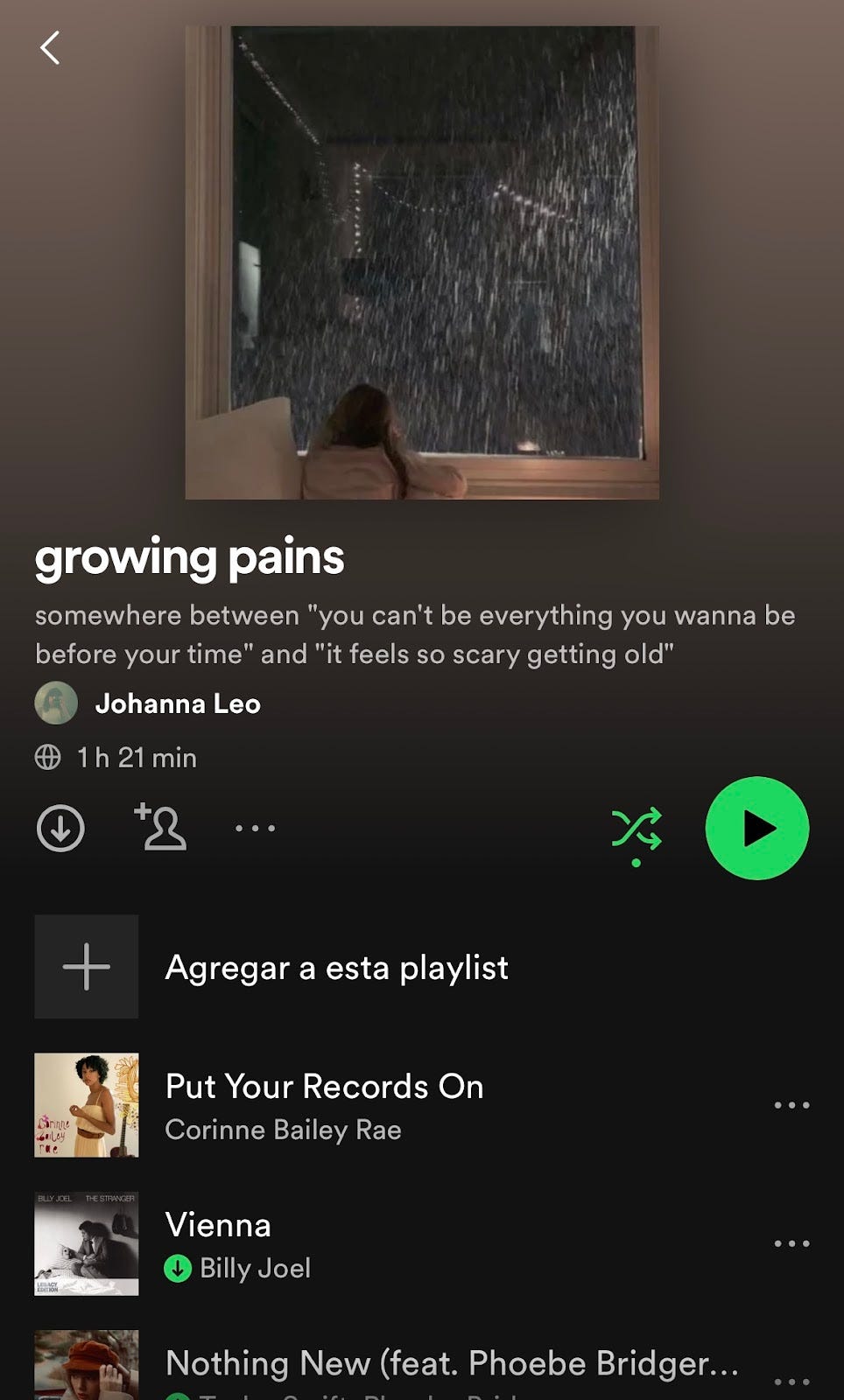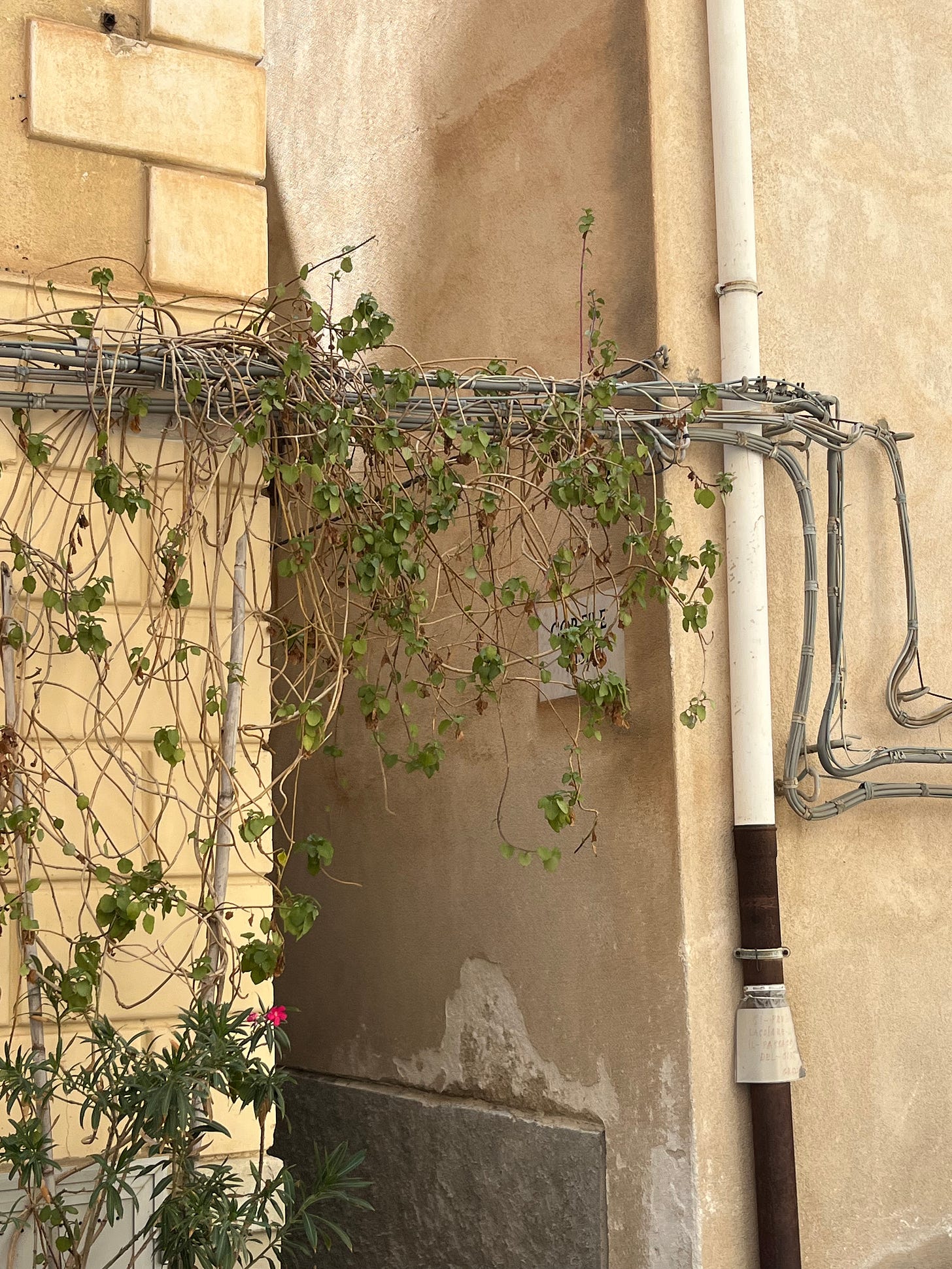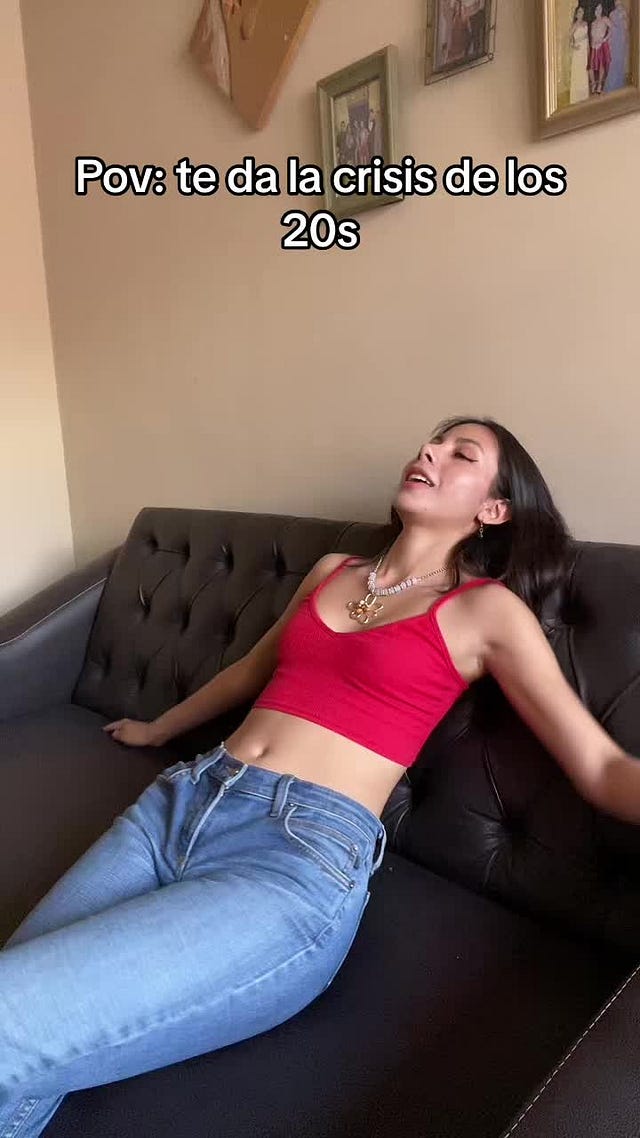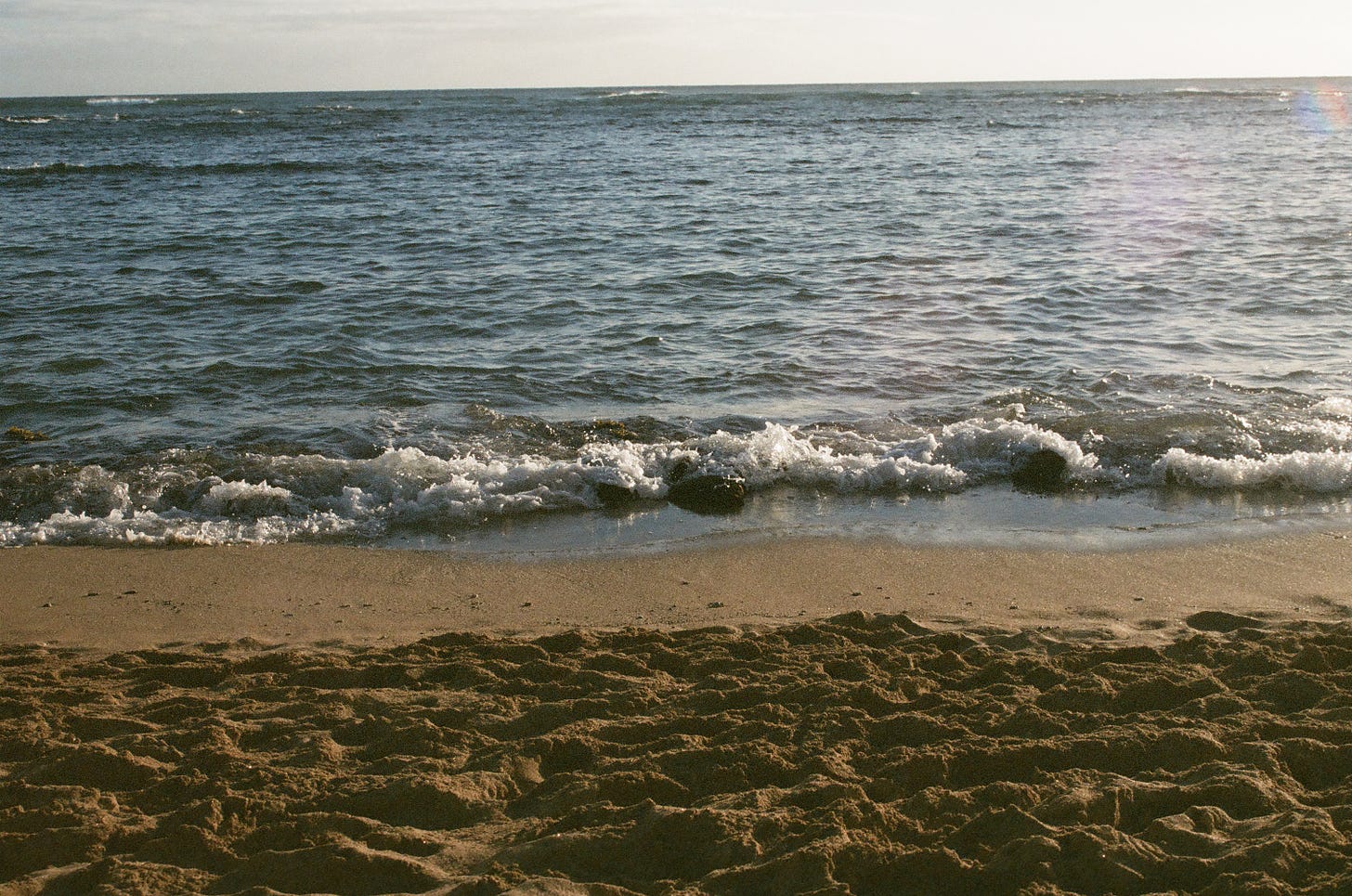facing the paradox of choice in your 20s
“I saw my life branching out in front of me like the fig tree in the story.”
Haz click aquí para leer la versión en español.
In August, I spent two weeks traveling Europe and, very à la Eat, Pray, Love, I foolishly expected to return home with a renewed sense of self and purpose. More specifically, I hoped to attain a clearer sense of direction, as if the location change would somehow sift the useless thoughts out of my brain and leave behind only those that were relevant and more legible. Somehow, the haze that had permeated my life since I moved home from the U.S. in June would dissipate, the fog would lift, and I would, miraculously, have an Aha! moment. What I wanted to do with my life and the next steps I should take to achieve that would miraculously become clear.
Unsurprisingly, though, I sat on my bed the Sunday after I returned home with more questions than I had before I left. The fog seemed denser, almost palpable this time. What am I going to do with my life? I just spent two weeks with my best friend doing what I love most; to attempt to recreate this sort of fulfillment permanently is something that seemed daunting, to say the least.
If you, like me, are or have ever been a twenty-something-year-old person, odds are you’ve found yourself at a similar crossroads before. The details shift, but the question is the same: What do I want to do with this life? What could fulfill me as much as my happiest moments and marginalize my mundane ones, my lowest, most confusing ones, until I can barely see their edges, all while providing me with a stable income? The potential paths I can follow seem, paradoxically, both endless and insufficient.

While I’ve tried to welcome this new start with excitement, I can’t help but be hyper-aware of how many opportunities for failure it represents. The weight of all the lives I could live and all those I have already forfeited creeps in and paralyzes me into indecision. The world continues its usual motion as I sit still on my bedroom floor and listen to Billy Joel try to persuade me to slow down and reassure me that I’m doing fine. But, in my early and mid-twenties, a period of seemingly infinite time and possibility, is when I have been the most reluctant to believe him.
I know that, for me, all the choices and paths that I can follow quickly alternate between inspiring and suffocating. I love to write, translate, and learn new languages, but I also love to bake, cook, and create new recipes. Do you know what else I love? To make people feel valued, heard, and understood, and to spend time in nature and learn about animals and the environment. And at the crossroads where I am simultaneously nothing and can become everything, I wonder if I should use my psychology degree, translate a book, write one from scratch, open a bakery, or volunteer at a rescue. I tell myself that whichever choice I make is momentary and that I am not chaining myself to a single life. Still, in a society that is set up to linearly build upon a chosen career and where any new venue requires an investment of not just time but money, my mantra fails to sink in. I visualize myself at this crossroads, turning and glimpsing at all of these potential paths, and defeated in my indecision, I surrender and refuse to move.
To burden ourselves with the task of selecting what we will do with the rest of our lives is not only unrealistic but incredibly unfair. I cannot task myself with choosing what I want for the entirety of the life ahead of me because I don’t know who will be living that life in a decade. But how do we make informed, long-term decisions with the impermanence of the self in mind? How do we sync the realization that our choices aren’t irreversible with the fear that a misstep this early on will set us up for a life we never signed up for?
I recently read about a concept called the paradox of choice, also known as choice overload. In summary, this is the notion that the more choices are available, the more paralyzing it becomes to make a decision. While logic may indicate that having various options would allow us to know what we want more efficiently, we cognitively cannot handle that much information. Often, we freeze as a result.
This isn’t only evident in career choices (an increasing number of degrees offered in universities, various modalities for work and school, access to almost any niche interest and certification we can come up with through the internet) but in everyday moments, too. Many coffee shops offer seemingly infinite alternatives for every drink (What milk? What size? What flavor? We have 52!). It seems like there’s a new diet and a new workout routine you must be doing (Are you going keto? High-carb? Carnivore? Plant-based? Do you spin or do pilates or yoga or run or–).
I know that, rather than being inspired by this amount of options, I often opt out of choosing altogether or go for the option that seems to generate less cognitive work for me. Furthermore, research indicates that choice overload does not only confuse us momentarily but often delays decisions, even those we consider important. Contrary to what I’ve told myself every time I procrastinate making a choice, being hyper-aware of all of these possibilities leads to more dissatisfaction, less confidence, and a higher likelihood of regretting our decision once we finally make it.
 Tiktok failed to load.
Tiktok failed to load.Enable 3rd party cookies or use another browser
For me, social media has further exacerbated this phenomenon. I open TikTok and am endlessly confronted by strangers telling me that I need to open a business now, travel the world, go back into office, become a UGC creator (does anybody know what that even is??), become an influencer, take an online data science certificate. They ask me to look at how they did it, how it’s so easy, so within reach—all I have to do, according to these strangers, is reach my arm out and grab it. Social media opens a window that allows me to look into all the lives I’m not living but could be living. And, through this window, I glimpse at all the versions of me I may want to be but seem to be forfeiting—the one that backpacks through Asia, the one with a 9–5, the girl boss with her own business, the data scientist that boasts six figures, the stay-at-home girlfriend/daughter/mom that goes to pilates and vlogs her day in the life, etc.
Social media has not only shown me all these lives but has made them seem both a click away and perpetually out of reach. Contrary to what strangers on the internet make it look like, these things take commitment, time, and, for the most part, money. I walk away from my screen feeling dissatisfied. I could be a model, a full-time traveler, an entrepreneur—instead, I am just me. I picture all these people on my screen shaking their heads, disappointed, wondering why I won’t just grab the life they so easily accessed. The saddest part is that, realistically, I also know I’ve achieved a lot. I have two undergraduate degrees, I’ve worked for some of my favorite publishers, I wrote a whole book. Still, somehow, nothing ever seems like enough; the grass is always greener, and I am always missing out.
Sylvia Plath said it more eloquently than I ever will in The Bell Jar:
“I saw my life branching out before me like the green fig tree in the story. From the tip of every branch, like a fat purple fig, a wonderful future beckoned and winked. One fig was a husband and a happy home and children, and another fig was a famous poet and another fig was a brilliant professor, and another fig was Ee Gee, the amazing editor, and another fig was Europe and Africa and South America, and another fig was Constantin and Socrates and Attila and a pack of other lovers with queer names and offbeat professions, and another fig was an Olympic lady crew champion, and beyond and above these figs were many more figs I couldn’t quite make out. I saw myself sitting in the crotch of this fig tree, starving to death, just because I couldn’t make up my mind which of the figs I would choose. I wanted each and every one of them, but choosing one meant losing all the rest, and, as I sat there, unable to decide, the figs began to wrinkle and go black, and, one by one, they plopped to the ground at my feet.”
Though my aversion to limiting myself and this weird hybrid of impostor syndrome/fear of missing out is not new to me whatsoever, it has become undeniably poignant in the year since I graduated college and even more so since I moved back to Mexico. My decisions feel like they hold more weight; though I was never actually playing pretend, there’s a lingering feeling that I’ve stepped into the real world. I’m choosing what life I want and, in turn, what lives I will be forfeiting in the process. I have been paralyzed with this indecision in recent months, intermittently translating, working on a novel, writing this Substack, looking into graduate school, and applying to corporate jobs to sustain myself outside of my current freelancing gig. But every step I take feels wrong, and sitting at this crossroad waiting for life to happen to me and pull me in any direction seems like a mistake, too. I’m looking up at the fig tree, and I think I need to reach out and try one before they begin plopping at my feet.
I feel ready to reach out my arm—or, rather, I feel ready to stop waiting to feel ready. I don’t think there will be a time when my dwelling will come to something beyond a distorted sense of comfort and falsely perceived risk management. If the research is any indicator, it seems that becoming more aware and maximizing my opportunities to the extent to which I’ve been attempting to do it will not make me any more confident in the path I choose.
This crossroads is one that, while exceedingly common in our twenties, will present itself repeatedly in various stages of life. As I wrote earlier, we are ever-evolving, and it is only reasonable that what we want out of life—from our career or other areas—will change and evolve with us. To me, that is a terrifying prospect even as I write it, but I’m trying to let my view change, shift my angle. I want to learn how to be inspired by the possibilities, even if I don’t know what they are yet.
While I thought about how to move forward and realistically plan for the future, I remembered something I learned in my Psychology of Emotion class in college. In short, people always think they’re done changing in any significant way, but this is untrue. Therefore, those who plan in shorter spans and leave room for flexibility are often happier. So, instead of going, “I’ll work in X company for 6 years, get married when I’m 28, buy a house when I turn 35,” a flexible version of this plan would go, “I want to work in a company that has *these* values and which allows me to work in *this* area or *that* area. I want to get married, ideally within the next 5 years. And I will start investing so I can eventually buy a house.” In the latter, there’s room for adjustment and opportunities you didn’t expect to present themselves. On the other hand, the former assumes you won’t want anything different and, most likely, both limits you from allowing yourself to and leaves you dissatisfied when something inevitably doesn’t go to plan.
As I read about the paradox of choice for this article, I learned that individualistic countries present a high incidence of choice overload (note: there’s little research on how collectivistic countries react to choice overload or deprivation). While the data is scarce as the paradox of choice is a relatively new concept, I hypothesize we might be making less community-oriented decisions or choosing paths where our independence is reinforced, which may further tax our cognitive systems. Furthermore, we definitely have the luxury of making more individualistic choices than many of our ancestors whose profession was passed down, collectively chosen, or selected exclusively for financial reasons, or who were non-negotiably expected to marry, have children, and more.
While I’m not suggesting we go back to older models and forfeit the plethora of options we have the privilege of accessing nowadays, I believe that using our support systems and procuring access to a community may help make those decisions. Informative interviews with professionals who work on what interests us, internships, online courses, or simply relying on close friends or family and receiving external feedback on our skills and interests could help relieve cognitive overload or bring us additional clarity.
In an ideal world, we would all have equal access to support systems and community, as well as additional time to explore our interests without monetary compensation or other concerns. Still, I recognize that is not the reality for everyone or that it may be a reality that fluctuates, as in some stages of my life it hasn’t been my own. Something I did recently to individually take action was brainstorming what I sought from my end result. It’s so easy to get caught up on the how and forget where we’re trying to go. Every goal will require a different path; becoming a travel blogger will fulfill someone with different priorities than an aspiring CEO. If you don’t know what the end result is in terms of labels or titles, think about what things you prioritize in your short-term goals that are more abstract. Is it learning? Adventure? Community? Financial stability? Prestige? Furthermore, taking a moment to acknowledge the things in my life that are already how I want them to be, that make me feel grateful, is a wonderful way to ground myself and remember I’ve already come further than I’d think.
Though it’s often hard to believe, I try to remember I can always change my mind. For the most part, I can always veer off course if I realize I’m on a different path than the one I want. Yes, it will take time and effort—but the time will pass, anyway. I repeat to myself that I am more than my career or my tangible achievements; that any single choice that I make will hardly define my existence to the degree that I seem to think it will. And, though I often feel like I’m running out of time, and I, like everyone, am bombarded by headlines praising achieving things at ridiculously young ages, the truth is my life doesn’t start and end in my twenties. These are all arbitrary deadlines, and compelling myself to become stagnant out of fear or convenience would be a substantial disservice to the life I could have if I allowed myself to take some risks. So, I choose to give myself permission to change and to make the “wrong” decisions, to not maximize and mentally explore every possibility before picking a fig off the tree.
I invite you to do the same, to trust that you’ll figure it out. And to listen to Billy Joel—as hard as it is to admit it, he’s right: You can’t be everything you wanna be before your time.
enfrentando la paradoja de la elección en tus veintes
Este agosto pasé dos semanas viajando por Europa y, muy al estilo de Comer, rezar y amar, esperaba regresar a México con una perspectiva renovada. Más específicamente, esperaba obtener un sentido de dirección más claro, como si el cambio de ubicación mágicamente fuera a colar mis pensamientos inútiles y dejar atrás sólo aquellos que fueran relevantes y legibles. De una forma u otra, el aturdimiento que había definido mi vida desde que regresé de Estados Unidos en junio se disiparía, la neblina se aclararía y yo, milagrosamente, tendría un momento de claridad pura.
Sin embargo, y para sorpresa de nadie, pasé el domingo después de mi regreso sentada en mi cama con más preguntas de las que tenía antes de irme. La neblina parecía más densa, casi palpable. No paraba de preguntarme con aún más insistencia que antes: ¿Qué quiero hacer con mi vida?
Si tú, como yo, eres o alguna vez has sido un joven de veintitantos años, es probable que te hayas encontrado en una encrucijada similar. Los detalles cambian, pero la pregunta central es la misma: ¿Qué quiero hacer con esta vida? ¿Qué podría llenarme tanto como mis momentos más felices y marginar los más mundanos, los más bajos y confusos hasta que apenas pueda verles el borde? ¿Qué profesión es la respuesta a todas estas preguntas y simultáneamente me provee con un ingreso estable? Los caminos que podría seguir me parecen, paradójicamente, interminables e insuficientes.
Aunque he intentado recibir este nuevo comienzo con emoción, no puedo evitar estar híper consciente de cuántas oportunidades para fallar representa. El peso de todas las vidas que podría vivir y todas aquellas que ya dejé pasar se asoma y me paraliza con indecisión. El mundo continúa sus movimientos habituales mientras me siento en el piso de mi habitación y escucho a Billy Joel intentando persuadirme que puedo relajarme, que voy bien. Pero, en mis veintes, un periodo de aparente tiempo y posibilidad infinita, es cuando he dudado más en creerle.

Sé que para mí, estar consciente de la cantidad de decisiones y caminos que puedo seguir alterna entre emocionarme y sofocarme. Amo escribir, traducir y aprender idiomas, pero igualmente amo la repostería, cocinar y crear nuevas recetas. ¿Y sabes qué más amo? Ayudar a que la gente se sienta valorada, escuchada y comprendida y pasar tiempo en la naturaleza, aprendiendo sobre animales y el medio ambiente. Y en este limbo en el que no soy nada y lo puedo ser todo, me pregunto si debería usar mi licenciatura en psicología, traducir un libro, escribir uno desde cero, abrir una panadería o ser voluntaria en un refugio de animales. Me reafirmo que cualquier decisión que tome es momentánea y que no me estoy atando a una sola vida. Aún así, en una sociedad que está hecha para construir y crecer dentro de una carrera y donde cualquier nueva avenida requiere una inversión de tiempo y dinero, mi mantra no acaba de hacer click. Me visualizo en esta encrucijada, volteando a ver todos estos posibles caminos y, derrotada por la indecisión, me rehuso a moverme.
Agobiarnos con escoger que haremos por el resto de nuestras vidas no sólo es poco realista pero increíblemente injusto. No puedo darme la tarea de escoger que quiero para el resto de mi vida porque no sé quién estará viviendo esa vida en una década. Pero, ¿cómo podemos tomar decisiones informadas y a largo plazo sin perder de vista la impermanencia del ser? ¿Cómo sincronizamos la idea de que nuestras decisiones no son irreversibles con el miedo de que un paso en falso nos llevará a tener una vida que nunca quisimos?

Recientemente aprendí de un concepto llamado la paradoja de la elección. En resumen, esta es la idea de que, entre más opciones tenemos, más nos paraliza escoger una. Aunque la lógica quizá indicaría que tener tanta variedad nos permitiría saber qué queremos con mayor facilidad, la realidad es que, cognitivamente, no podemos manejar tanta información.
Esto no sólo es evidente con elecciones académicas o profesionales (un incremento en ofertas educativas, varias modalidades para trabajar y estudiar, acceso a casi cualquier interés o certificación que queramos en línea), sino también en momentos diarios. Varias cafeterías ofrecen alternativas casi infinitas para cada bebida (¿Qué leche? ¿Qué tamaño? ¿Qué sabor? ¡Tenemos 52!). Igualmente, diario parece haber una nueva dieta y rutina de ejercicio que no te puedes perder (¿Estás comiendo keto? ¿Alta en proteína? ¿Carnívora? ¿Basada en plantas? ¿Vas a spinning o a pilates o a yoga o corres o—?)
Sé que, para mí, esta abundancia de opciones me abruma más de lo que me inspira. Constantemente prefiero no escoger en absoluto o seleccionar la opción que menos trabajo cognitivo me genera. Es más, fuentes indican que la abundancia de posibilidades no sólo nos confunde momentáneamente, sino que repetidamente resulta en que retardemos decisiones, aun aquellas que consideramos importantes. Al contrario de lo que me he dicho cada vez que procrastino decidir, estar híper consciente de todas las posibilidades lleva a falta de satisfacción, menos confianza y una mayor probabilidad de arrepentirse de nuestra decisión cuando por fin la tomamos.
 Tiktok failed to load.
Tiktok failed to load.Enable 3rd party cookies or use another browser
Para mí, las redes sociales han exacerbado este fenómeno. Abro TikTok y me encuentro con un sin fin de desconocidos intentando convencerme de que tengo que abrir un negocio, viajar por el mundo, volver a la oficina, convertirme en un creador UGC (sigo sin saber qué es eso), convertirme en influencer, tomar un certificado de ciencia de datos—todo antes de cumplir los 30. Me piden que vea como lo lograron, como es tan fácil, tan dentro de mi alcance. Las redes sociales han abierto una ventana que me permite ver todas las vidas que no estoy viviendo pero podría estar viviendo. Y, a través de esta ventana, alcanzo a ver todas las versiones de mí misma que estoy escogiendo no ser: la que se va de mochilazo por Asia, la del trabajo de oficina, la girl boss con su propia negocio, la científica de datos con un salario impresionante, la novia/hija/mamá que se queda en casa y va a pilates y es vlogger, etc.
Las redes sociales no sólo me han mostrado estas vidas, sino que las han hecho parecer simultáneamente a un click de distancia y completamente fuera de mi alcance. Al contrario de lo que los desconocidos en línea aparentan, todas estas cosas toman compromiso, tiempo, y mayormente, dinero. Me alejo de la pantalla con un sentimiento vacío. Podría ser modelo, una viajera a tiempo completo, una entrepeneur—pero sólo soy yo. Me imagino a la gente de mi pantalla mirándome con desaprobación, decepcionadxs, preguntándose por qué me rehuso a tomar la vida que accedieron con tanta facilidad. La parte más triste es que, de forma realista, sé que he logrado bastante. Tengo dos licenciaturas, he trabajado para algunas de mis editoriales favoritas, escribí un libro. Sin embargo, de alguna forma, nunca nada parece suficiente; el pasto siempre es más verde en otro lado, y siempre me estoy perdiendo de algo.
Sylvia Plath lo expresó con más elocuencia que yo en La campana de cristal:
“Vi mi vida extendiendo sus ramas frente a mí como la higuera verde del cuento.
De la punta de cada rama, como si de un grueso higo morado se tratara, pendía un maravilloso futuro, señalado y rutilante. Un higo era un marido y un hogar feliz e hijos y otro higo era un famoso poeta, y otro higo era un brillante profesor, y otro higo era Europa y África y Sudamérica y otro higo era Constantino y Sócrates y Atila y un montón de otros amantes con nombres raros y profesionales poco usuales, y otro higo era una campeona de equipo olímpico de atletismo, y más allá y por encima de aquellos higos había muchos más higos que no podía identificar claramente.
Me vi a mí misma sentada en la bifurcación de ese árbol de higos, muriéndome de hambre sólo porque no podía decidir cuál de los higos escoger. Quería todos y cada uno de ellos, pero elegir uno significaba perder el resto, y, mientras yo estaba allí sentada, incapaz de decidirme, los higos empezaron a arrugarse y a tornarse negros y, uno por uno, cayeron al suelo, a mis pies.”
Aunque mi aversión a limitarme y este híbrido entre síndrome del impostor/FOMO no es nuevo para mí en absoluto, se ha vuelto particularmente palpable en el año desde que me gradué de la universidad, y aún más desde que me regresé a vivir a México. Mis decisiones parecen tener más peso; aunque mis elecciones siempre tuvieron impacto, no me sacudo la sensación de que acabo de entrar al mundo real. Estoy escogiendo qué vida quiero y, por lo tanto, cuáles dejaré ir en el proceso. Me ha paralizado esta indecisión en meses recientes, los cuales he pasado traduciendo, trabajando en una novela, escribiendo en este Substack, buscando maestrías y aplicando a trabajos corporativos para sostenerme fuera del freelancing que hago. Sin embargo, todo esto lo he hecho con una intermitencia que impide verdadero avance, pues cada paso que tomo se siente incorrecto. Pero quedarme sentada en este cruce esperando a que la vida me suceda y me jale en cualquier dirección también me parece un error. Estoy viendo hacia arriba a la higuera y creo que necesito estirar el brazo y probar un higo antes de que empiecen a caer a mis pies.
Me siento lista para estirar el brazo. O, mejor dicho, me siento lista para dejar de esperar a sentirme lista. Creo que seguir analizando mis opciones tan sólo me llevará a un sentido distorsionado de seguridad y una ilusión de control de riesgos. Si la ciencia es un indicador, parece ser que hacerme más consciente de mis oportunidades y maximizarlas al extremo al que lo intento hacer no me generará más confianza o satisfacción en el camino que elija.
Esta encrucijada, aunque común en nuestros veintes, se presenta en varias etapas de la vida. Como escribí al principio, siempre estamos cambiando y es razonable que lo que queremos de la vida—en nuestra carrera u otra área—cambie y evolucione con nosotros. Para mí, este es un prospecto que me aterra de tan sólo pensarlo, pero estoy intentando que mi punto de vista cambie. Quiero aprender a que me inspiren las posibilidades, aún cuando no puedo imaginar cuales son.
Cuando comencé a evaluar como quería seguir adelante y a planear de manera realista para el futuro, recordé algo que aprendí en una de mis clases de psicología. En resumen, tendemos a subestimar significativamente cuanto vamos a cambiar en años próximos. Por lo tanto, aquellos que planean en lapsos de tiempo más cortos y dejan lugar para ser flexibles suelen ser más felices. Así que, en lugar de decir, “Voy a trabajar en X compañía por 6 años, casarme cuando cumpla 28 y comprar una casa a los 35,” una versión flexible de este plan sonaría algo como, “Quiero trabajar en una compañía con *estos* valores y que me permita trabajar en *esta* o *aquella* área. Quiero casarme, idealmente dentro de los siguientes 5 años. Y voy a comenzar a invertir para eventualmente comprarme una casa.” En la segunda opción, hay lugar para ajustar los planes y para que oportunidades inesperadas se presenten. Por otra parte, la primera opción asume que no querrás nada distinto y, probablemente, te limite en un futuro a permitirte salir de ese camino, dejándote insatisfechx cuando algo no salga de acuerdo al plan.
Cuando leí acerca de la paradoja de la elección para este artículo, aprendí que los países individualistas presentan una alta incidencia de este fenómeno (Nota: hay poca investigación en países colectivistas). Aunque los datos son escasos porque la paradoja de la elección es un concepto relativamente reciente, esta información me llevó a pensar que quizá estamos tomando menos decisiones orientadas hacia nuestra comunidad o priorizando caminos que reafirmen nuestra independencia, lo cual puede sobrecargar a nuestros sistemas cognitivos. Con acceso a tanta información, puede haber una tendencia a apoyarse menos en profesionales. Igualmente, tenemos la opción de tomar decisiones más individualistas que la mayoría de nuestros ancestros cuyas profesiones fueron heredadas, escogidas colectivamente o seleccionadas exclusivamente por razones económicas, o que estaban obligados a casarse, tener hijos y más.
Mientras no estoy sugiriendo que revertamos a modelos más antiguos y dejemos ir la plétora de opciones que tenemos el privilegio de acceder hoy en día, creo que utilizar nuestros sistemas de apoyo y procurar acceso a una comunidad puede ayudarnos a tomar decisiones con mayor facilidades. Entrevistas informativas con profesionales que trabajan en lo que nos interesa, pasantías, cursos en línea o simplemente platicar con familia y amigxs cercanos para buscar retroalimentación en nuestras habilidades e intereses nos podría ayudar a soltar un poco de esa carga cognitiva.
En un mundo ideal, todos tendríamos acceso equitativo a sistemas de apoyo y comunidad, así como a tiempo adicional para explorar nuestros intereses sin preocuparnos por compensación monetaria u otras cosas. Sin embargo, reconozco que esa no es la realidad de todos y en ciertas etapas de mi vida tampoco ha sido la mía. Algo que he hecho recientemente para tomar acción individual es pensar en lo que busco de mi resultado final. Es tan fácil quedarse atrapado en el como que olvidamos a donde queremos llegar. Cada meta requerirá un camino distinto; convertirse en un blogger de viajes cumplirá prioridades distintas que convertirse en CEO. Si no sabes qué buscas en términos de títulos, piensa que cosas más abstractas son una prioridad en tus metas a corto plazo. ¿Aprendizaje? ¿Aventura? ¿Comunidad? ¿Estabilidad económica? Igualmente, tomar un momento para reconocer las cosas en mi vida que ya son como las quiero y por las que estoy agradecida es una forma maravillosa de recobrar perspectiva.
Aunque a veces me cuesta creerlo, intento recordar que siempre puedo cambiar de opinión. Puedo salirme del camino si me doy cuenta que estoy avanzando hacia algo distinto a lo que busco. Sí, tomará tiempo y esfuerzo, pero el tiempo pasará de todos modos. Me repito que soy más que mis etiquetas o mis logros tangibles, que una decisión raramente definirá mi vida al grado que parezco creer que lo hará. Y aunque a veces siento que se me acaba el tiempo y, como todos, constantemente estoy leyendo titulares sobre gente con logros a edades ridículamente cortas, la realidad es que mi vida no empieza y termina en mis veintes. Estas líneas temporales son completamente arbitrarias y convencerme de quedarme quieta por miedo o conveniencia sería un injusticia a la vida que podría tener si tan sólo me permitiera arriesgarme. Así que decido darme permiso de cambiar y tomar las decisiones “equivocadas,” de no maximizar y explorar mentalmente todas las posibilidades antes de estirar mi brazo hacia la higuera.
Te invito a hacer lo mismo y a escuchar a Billy Joel cuando nos dice que no podemos serlo todo antes de tiempo. Aunque sea difícil creerlo, tiene razón.












